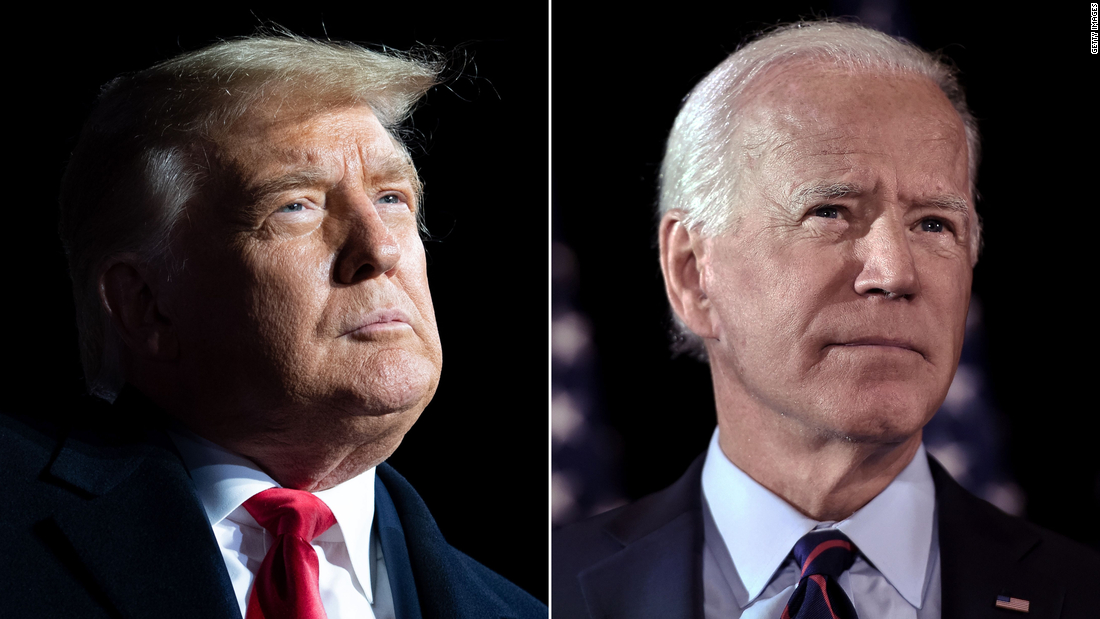
But there is an asterisk to the Great Lakes' importance in this election: Arizona.
The emergence of Arizona as a swing state could throw a major wrench into Trump's electoral hopes and provide a big lifeline to former Vice President Joe Biden.
The math as it stands now is pretty simple. Biden gets to 278 electoral votes if he wins the states Hillary Clinton won in 2016 (232 electoral votes -- he's ahead in all of these states) and Michigan (16 electoral votes), Pennsylvania (20 electoral votes) and Wisconsin (10 electoral votes). Biden holds an edge of greater than 5 points in each of these Great Lake states.
But under this map, if Trump were to win any of these Great Lake states and hold onto the rest of the states he won in 2016, the fewest number of electoral votes Trump could get would be 270.
Even if Trump were to lose Nebraska's second congressional district (worth 1 electoral vote and where Trump is down 7 points in the polling average) in a scenario where he won at least one of the aforementioned Great Lake battleground states, the worst he could do is tie. Trump would get at least 269 electoral votes, assuming he also took Florida and North Carolina.
Trump would not be guaranteed a win if a tie were to occur in the Electoral College, though he'd be favored.
Now throw Arizona into the mix. It has a very important 11 electoral votes. If Biden won those 11 electoral votes and Nebraska's 2nd congressional district, the math changes entirely.
The worst Biden could do is win exactly 270 electoral votes in a scenario where he wins Arizona, the Clinton states, Nebraska's 2nd congressional district and two of the key Great Lake battlegrounds we've been talking about.
There's a very realistic shot Biden can take Arizona. He's up by about 3 to 4 points in the polling aggregate. That's larger than his lead in the often touted swing states of Florida and North Carolina.
The fact that Arizona seems to have jumped in front of Florida and North Carolina as possible Biden wins shouldn't be too surprising. There are a lot of culturally upscale suburbs in Arizona that have traditionally voted Republican, but have shifted to the left during the Trump administration, like so many other suburbs that look a lot like those that are littered throughout the national landscape.
I should note Arizona still seems to be to the right of Michigan, Pennsylvania and Wisconsin in the polls.
But there's good reason to think that the polls in Arizona are less likely to underestimate Trump than in the Great Lakes. You may recall Trump overperformed his polling in the Great Lakes in 2016.
In 2016 and 2018, the polling in Arizona was pretty accurate. As the Cook Political Report's David Wasserman has pointed out, that's the case for the polling in the Southwest generally. If anything, it has underestimated the Democratic candidates.
Part of that underestimation may have to do with the high Hispanic population in the state. Hispanics will likely make up close to 20% of the Arizona electorate in 2020. Biden, in general, has been underperforming among Hispanics compared to how Clinton did in 2016.
As The New York Times' Nate Cohn has noted, however, Hispanic voters are often difficult to reach in polls and can decide on their vote late.
Because of the way polling misses generally occur, it's quite possible Biden underperforms in the Great Lakes and still does well enough to win in Arizona.
And that means, Trump may very well need to win not just one of Michigan, Pennsylvania or Wisconsin to take this election. He may need to win two. That could prove to be a more difficult task for Trump and throws a wrench into a seemingly straightforward, even if daunting, plan for him.
"how" - Google News
October 28, 2020 at 07:06PM
https://ift.tt/2HGix4k
How Arizona complicates Trump's re-election bid - CNN
"how" - Google News
https://ift.tt/2MfXd3I
Bagikan Berita Ini














0 Response to "How Arizona complicates Trump's re-election bid - CNN"
Post a Comment